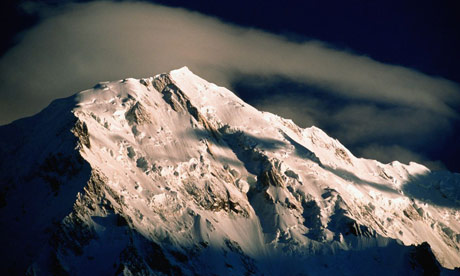IPCC officials admit mistake over melting Himalayan glaciers
Senior members of the UN's climate science body admit a claim that Himalayan glaciers could melt away by 2035 was unfounded
The UN's climate science body has admitted that a claim made in its 2007 report - that Himalayan glaciers could melt away by 2035 - was unfounded.
The admission today followed a New Scientist article last week that revealed the source of the claim made in the 2007 report by the Intergovernmental Panel on Climate Change (IPCC) was not peer-reviewed scientific literature – but a media interview with a scientist conducted in 1999. Several senior scientists have now said the claim was unrealistic and that the large Himalayan glaciers could not melt in a few decades.

The Himalayas. The row centres on the IPCC’s 2007 report, which said 'glaciers in the Himalayas are receding faster than in any other part of the world.' Photograph: Getty
In a statement (pdf), the IPCC said the paragraph "refers to poorly substantiated estimates of rate of recession and date for the disappearance of Himalayan glaciers. In drafting the paragraph in question, the clear and well-established standards of evidence, required by the IPCC procedures, were not applied properly."
It added: "The IPCC regrets the poor application of well-established IPCC procedures in this instance." But the statement calls for no action beyond stating a need for absolute adherence to IPCC quality control processes. "We reaffirm our strong commitment to ensuring this level of performance," the statement said.
The IPCC says the broader conclusion of the report is unaffected: that glaciers have melted significantly, that this will accelerate and affect the supply of water from major mountain ranges "where more than one-sixth of the world population currently lives".
Jean-Pascal van Ypersele, vice-chair of the IPCC, added that the mistake did nothing to undermine the large body of evidence that showed the climate was warming and that human activity was largely to blame. He told BBC News: "I don't see how one mistake in a 3,000-page report can damage the credibility of the overall report. "
The Indian environment minister, Jairam Ramesh, said earlier in the week: "The [glaciers] are indeed receding and the rate is cause for great concern … [but the claim is] not based on an iota of scientific evidence."
The Indian government criticised the IPCC's glaciers claim in November at the launch of its own discussion paper, written by geologist Vijay Kumar Raina, which admitted that while some glaciers in the Himalayas were retreating, it was "nothing out of the ordinary. Nothing to suggest as some have said that they will disappear."
At the time, the chairman of the IPCC, Rajendra Pachauri, dismissed the report as not peer-reviewed and said: "With the greatest of respect this guy retired years ago and I find it totally baffling that he comes out and throws out everything that has been established years ago."
Georg Kaser, an expert in tropical glaciology at the University of Innsbruck in Austria and a lead author for the IPCC, said he had warned that the 2035 prediction was clearly wrong in 2006, months before the report was published. "This [date] is not just a little bit wrong, but far out of any order of magnitude," he said.
"All the responsible people are aware of this weakness in the fourth assessment. All are aware of the mistakes made," he said. "If it had not been the focus of so much public opinion, we would have said 'we will do better next time'. It is clear now that working group II has to be restructured."
The reports of the IPCC collate the work of thousands of scientists and are assessed through a process of peer-review and then approved by the 192 governments who are members of the UN Framework Convention on Climate Change. Its work is seen as the most comprehensive account of global warming.
The chair of the IPCC, Rajendra Pachauri, has made no personal comment on the glacier claim: But yesterday, at an energy conference in Abu Dhabi, he responded to British newspaper articles criticising his chairmanship of the IPCC. "They can't attack the science so they attack the chairman. But they won't sink me. I am the unsinkable Molly Brown. In fact, I will float much higher," he told the Guardian.
The row centres on the IPCC's "fourth assessment" report in 2007, which said "glaciers in the Himalayas are receding faster than in any other part of the world and, if the present rate continues, the likelihood of them disappearing by the year 2035 and perhaps sooner is very high if the Earth keeps warming at the current rate." The claim appears in the full report, but not in the more widely read "Summary for policymakers".
The claim was attributed to a report by the campaign group WWF, but in the New Scientist article, Guardian writer Fred Pearce noted that WWF had cited a 1999 interview in the magazine with Indian glaciologist Syed Hasnain as the source of the claim. Hasnain told the magazine last week that "it is not proper for IPCC to include references from popular magazines or newspapers".

No comments:
Post a Comment